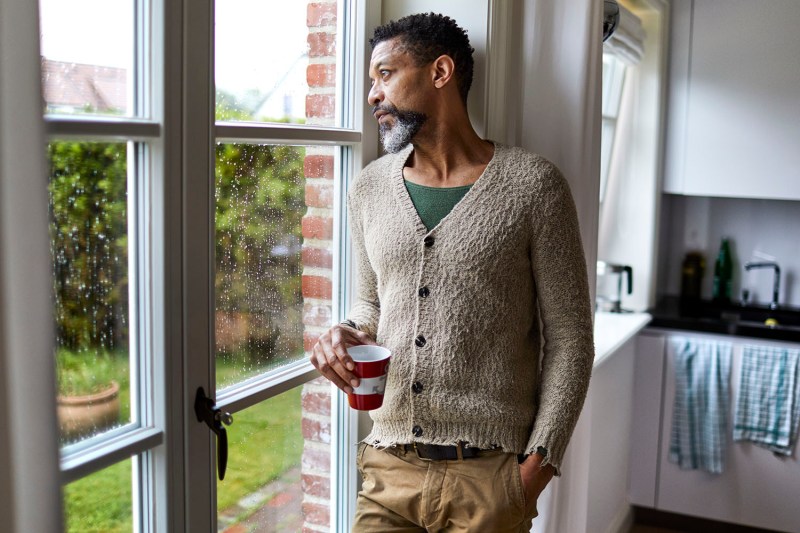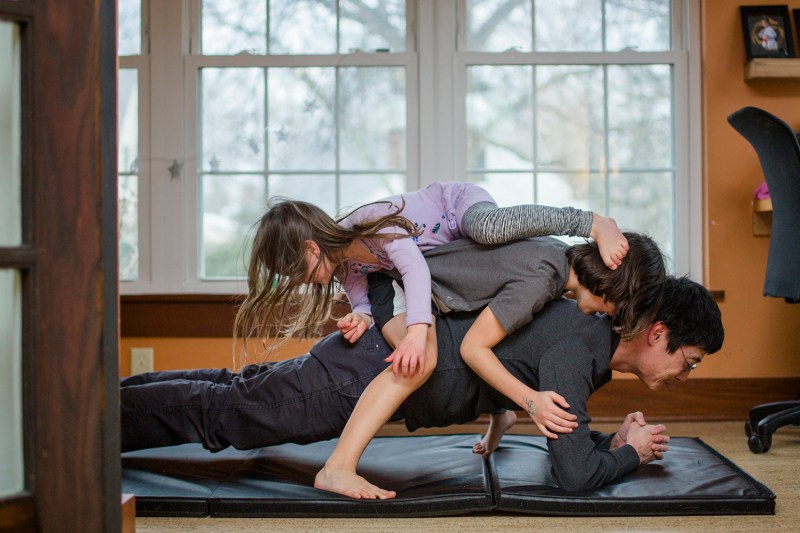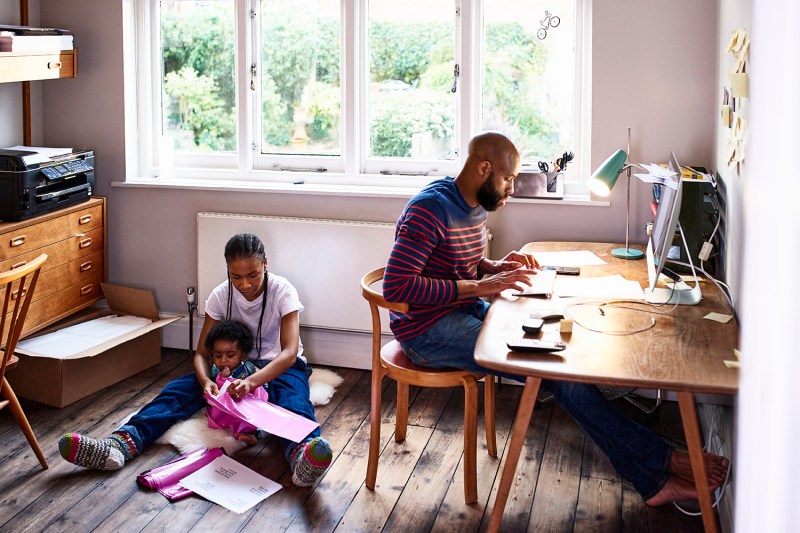It’s Day 21 (or 36, or 48, or whatever) of shelter-in-place. How’s everybody doing? I don’t know about you, but I can vaguely remember a time when, swamped with work and social engagements, I’d wish aloud that I could indefinitely stay inside my cozy house and not do anything. As the saying goes, be careful what you wish for. Even hardened introverts are starting to go a little crazy under social isolation. If you’re like me, you may be wondering how much longer your physical and mental health can handle it.

With my sanity hanging by a thin thread, I reached out to Dr. Dan Pardi, who has been long been studying how lifestyle choices impact health and functionality. He even designed a platform around it: HumanOS provides education, training, and interviews with experts on how small, strategic changes to your routine can improve the body’s overall health, as well as its integrated immune response.
In speaking with Dr. Pardi, I learned an important new word: exposome. This term, coined in 2005, refers to the sum total of environmental, maternal, and lifestyle exposures that hasten the body’s natural degeneration. Most people refer to this as “aging” and assume little can be done about it. But Dr. Pardi’s research shows that it doesn’t have to be that way.
“As a species,” says Dr. Pardi, “our age-old habits of eating, sleeping, physical activity, as well as our sources of life stress have changed dramatically over the past several hundred years, while our genetic make-up has largely remained the same. In addition, our bodies are now challenged by an increasingly hostile environment with pollution of air and water, casual and specific exposure to UV radiation, toxic chemicals, rising global temperatures, and extremes of weather.”
Oh, and don’t forget to add a global pandemic to the mix.
So how can you and I stay physically and mentally healthy in isolation? The key, says Dr. Pardi, is reversing “mismatch.” By realigning your lifestyle with the practices that your body is genetically suited to, you can optimize your body’s immune response to disease, improve your resilience to stress, and, as a bonus, maintain your youthful glow and vigor well into old age.
After consulting Dr. Pardi on how to adapt his core health principles to current shelter-in-place conditions, I’m happy to report that his expert tips are not only helping me get through shelter-in-place with my physical and mental health intact but also making me feel more confident about taking on normal life again. Try them for yourself, and see what just a few simple changes can do for you. (And if you’ve got questions, the HumanOS blog has all the answers you could ever want.)
Diet
One of the biggest impediments to changing our eating habits is time. We know we should be eating better than we do, but our busy schedules hold us back from figuring out what “better” really means, let alone making the effort to change.
But now that time is no object, you might discover that eating “better” isn’t as complicated as people have made it. If you look at the diet of our primitive ancestors (whose genetic make-up we all carry in our own bodies), it was based mainly on two things: plants and protein. There, was that so hard?
Honestly, the hardest thing for the modern American to change about their diet is eliminating packaged and processed foods. It goes without saying that ancestral man got all his nutrients from whole-food sources. So the less refined sugar and processed food you consume, and the more you rely on things like high-quality meat, seafood, and dairy, along with a wide variety of vegetables, fruits, legumes, and whole grains, the closer you’ll match the diet that your body was built for.
We know that not all these foods are as easily accessible as they were a couple of months ago. But on the upside, you’ve probably cleaned out most of your fridge and pantry already in an effort to avoid trips to the grocery store. When you do restock, reach for the closest thing you can find to whole foods. For example, canned wild-caught fish is a fine substitute for fresh. If you’re running low on eggs and butter, nut butter offers a two-for-one punch of protein and fat. And if you’re having a hard time getting hold of fresh produce, fermented vegetables like sauerkraut, pickles, and kimchi offer the vitamins you’re looking for, accompanied by a helping of beneficial bacteria.

Dr. Pardi also advises that for optimal health, it’s good to consider the timing of your diet. “The need for energy production changes considerably across the 24-hour period based on energy demands. A body may handle a burst of calories from a meal more or less effectively depending on what time of day it is, and what types of enzymes are being churned out at that time,” he explains.
While research is still being done to determine when and how our metabolism supports different functions at different times of the day, it’s well agreed that eating a big meal late at night can mess up your circadian rhythms, contributing to poor sleep, inefficient uptake of nutrients, and generally tearing down the body instead of building it up the way food is supposed to.
Here are more suggestions for the best groceries for quarantine.
Sleep
Sleep is crucial to physical well-being. Sleep is when your body rests, recovers, and regenerates from the work it’s been doing to keep you functional and disease-free. Without that opportunity, your systems are running on a deficit, like a car trying to maintain highway speed when it’s low on gas. To ensure your chances of fighting off illness, you need to protect your sleep time like it’s the last packet of Emergen-C left on Earth.
Sleep is also crucial for mental health. Dr. Pardi pointed me to a quote from leading sleep researcher Marcos Frank, Ph.D.: “While you’re sleeping, mechanisms that are activating that are part of this complete process that makes the brain change itself in light of new experience.” In other words, when you sleep, your brain is processing the day’s stimulation — sights, sounds, thoughts, emotions, facts — and putting them into an order that helps you operate properly in the world. Without that time to order those inputs, you’re left with a chaotic mix of ideas, impressions, and emotional loose connections that can lead to (or worsen) issues like anger, anxiety, depression, and addiction. At the very least, it throws a serious wrench into your mental productivity the following day.
So what is adequate sleep? It not just the number of hours, but the quality, i.e., how deeply you’re sleeping. There are two factors that contribute to deep, restorative sleep. One is consistency: Going to bed and rising at roughly the same time each day. These times aren’t meant to be the same for everyone, which leads us to the second factor: chronotype. Studies show that different people are suited to being asleep within different nightly timeframes. (This connects to the practice within ancestral communities of having at least a few individuals awake while the others were sleeping, in order to keep watch for danger.) You can use this questionnaire to figure out your chronotype. But whether you’re an early riser or a night owl, the point is to stick to a plan so that your body gets the restorative sleep it needs.
Movement
Along with oxygenating your blood and producing a rush of feel-good hormones, “physical activity boosts the innate immune system by increasing the body’s production of macrophages [white blood cells that eat viruses, parasites, and bad bacteria],” Dr. Pardi says. We could all use a few more of those right now.
And good news — you don’t have to work out hard for hours every day to get this benefit. (In fact, there’s evidence to suggest that frequent hard exercise can increase your risk of infection.) Instead, a daily pattern of just 30 to 40 minutes of low-impact physical activity each day will get the job done. Dr. Pardi points out a study showing that people who walk 40 minutes per day have been shown to have half as many sick days due to upper respiratory infections.

Of course, depending on where you live, going out for a walk might not be an option, at least not every day. If you’re stuck indoors, you can leverage a method created by therapist and coach Aaron Alexander, who has worked with elite athletes as well as ordinary folks to relieve pain, increase strength, and optimize their movement pattern. Alexander’s method is built around five basic exercises that can be effortlessly integrated into your day. Not only will these simple movements get your daily dose of physical activity, but they’re also strategically designed to offset the cumulative damage from all the sitting, lounging, and hunching over screens that we’re doing these days.
No matter what you choose, Dr. Pardi recommends aiming to start your day with some light movement: A walk, some light stretching, or even a more rigorous workout. Studies show it’s a more effective wake-up than caffeine, and doing it early in the day will set you up for feeling and thinking your best the rest of the day.
Sensory Inputs
In the modern world, our connection to a natural environment is tenuous at best. Most of us spend the day in temperature-controlled rooms flooded with artificial light, infused with chemically produced scents, staring at buildings, furniture, and screens made by man, all accompanied by the ambient noise of machinery. Isn’t it funny, and revealing, how just describing it all is kind of a bummer? So it’s no surprise to hear from Dr. Pardi that “a growing body of research shows that people who spend time outside in sunny, green, and natural spaces tend to be happier and healthier than those who don’t.”
Again, the current situation makes it a little hard to act on this information, unless you’re fortunate enough to live out in the country or have a national or state park in your backyard. If your area’s shelter-in-place guidelines make your trips outdoors few and far between, here are a few ways to tune up your inputs while staying at home.

Light
Humans need a variety of light spectra throughout the day for optimal health. While blue light (the kind we get from LED bulbs and technology screens) isn’t bad in and of itself, too much of it can mess with healthy brain activity as well as circadian rhythms. To avoid getting seasonal affective disorder while sheltering in place, you can do things like wearing blue-light-blocking glasses while working on a computer and using your phone, as well as exchanging the LED bulbs in your house or room for incandescent ones. As much as possible, move your workspace to a part of your home that is flooded with natural light. At the very least, try to spend at least 20 minutes in the sunshine (either outdoors or in front of a window) between the hours of 8 a.m. and 3 p.m., when the sun is brightest. According to Dr. Pardi, “outdoor natural light is orders of magnitude more intense [than indoor light].” More photons mean a more active brain and a better mood to boot.
Temperature
Humans are truly genius at buffering themselves from changes due to seasons, weather, or time of day. However, according to Dr. Pardi, stepping out of your temperature comfort zone is actually quite beneficial to both body and mind. “Exposure to heat and cold are adaptive stressors,” he says, “and the most obvious one is cold. Cold is shocking and activates your sympathetic nervous system, which is an input to the timing of your circadian clock.” In other words, spending the last 30 seconds of your shower in cold water will kick your body’s physical and mental systems into high gear and make you more alert, setting you up for a more positive, productive day.
Sight, Sound, and Smell
Studies on a variety of subjects, including college students and prison inmates, showed that exposure to nature — whether through actual outdoor time or even just a photo or video of a natural landscape — lowered stress responses and the incidence of violence. Similar results were achieved through natural sounds, whether subjects experienced them in an outdoor environment or on a playlist of bird calls, water flowing, and wind in the trees. As for smell, research has shown that natural smells have a wide range of health benefits, from cedar triggering the increase of muscle tissue to peppermint and orange improving the lungs’ endurance capacity.
The idea is that natural inputs like these influence the flight-or-fright and rest-digest functions of the autonomic nervous systems. While artificial sensory inputs trigger the brain to focus inward (similar to states observed in anxiety, post-traumatic stress disorder, and depression), natural sensory inputs encourage the brain to focus outward, leading to an overall state of relaxation and better performance in tasks that require external attention. “Interestingly,” Dr. Pardi adds, “individuals [in these studies] who showed evidence of the greatest stress before starting the experiment showed the greatest bodily relaxation when listening to natural sounds.”
If you can’t get out for a walk in the woods or along the beach, there are plenty of “hacks” to give you the same benefits. Trade your Twitter scrolling for a nature documentary on Netflix, exchange your audio newsfeed for a beautiful soundscape series, and fire up your essential oil diffuser with the scent of your favorite campsite.
Relationships
It’s no secret that ancestral man lived within a small, intimate network of family and community. From protecting each other physically to sharing in each other’s daily work to sleeping side by side, human beings have an instinct for relationships deeply encoded in our bodies and minds.
“Our brain evolved, at least in part, as a processing system for social information,” says Dr. Pardi. “The mind does not just encompass what is within us — it is also between us.”

He points to the work of Dr. Dan Siegel, founding co-director of the Mindful Awareness Research Center at UCLA and a pioneer in a field known as interpersonal neurobiology (sometimes referred to as relational neuroscience). This field examines human development and function as a product of interactions between the body, the mind, and relationships with one another. Dr. Siegel’s work shows that our relationships with each other directly affect the molecules that contribute to physical and mental well-being. According to Dr. Siegel, energy flows through the brain in much the same way that it does through relational communication; the mind takes in information and organizes it into categories, concepts, and finally words and symbols, which we then transmit to each other through language and pictures. Without a consistent flow of energy in and out, the mind becomes either rigid or chaotic, both states that negatively impact the body’s health.
It’s heady stuff, but the bottom line is that human connection is a primary source of well-being. The love, kindness, and empathy that comes from human connection registers in your brain and your brain communicates it to your entire body. So keep doing those virtual happy hours, dance parties, FaceTime check-ins, text message threads, and phone calls, even if you feel like you have nothing new to say. These methods may seem like a poor substitute for the human connection you crave, but without them, you’d be a lot worse off.
Here are some more specific tips for couples in quarantine.
Stress Modulation
At the end of the day, all of the techniques listed above are simply specific ways to dial down the stress on our bodies and minds by reducing the work we have to do to make up for environmental mismatch. But there is one major stress reduction technique that ancestral man didn’t have handy. We’re talking about meditation.
Biologists, physicians, and other health researchers are still trying to crack the code on meditation’s benefits to the body and mind — at this point, there’s still no rule for what type of meditation works best, or how long you have to practice in order to get results. However, says Dr. Pardi, “we know that these different practices result in distinct electrophysiological signatures in people’s brains,” and as a result, “one of the many things that I love about meditation is that I can tune my practice to hone certain skills. If I want to be more compassionate, I can increase the number of mettā (loving-kindness meditation) sessions that I do. If I want to improve my attention, I can focus more on ānāpānasati (focused-attention meditation) sessions. You get the idea.”
When things feel darkest for you, take the opportunity to retreat to a quiet place in your home, drop to your knees, and empty your mind by listening to your breath. You’ll be surprised how much it changes the world around you.


